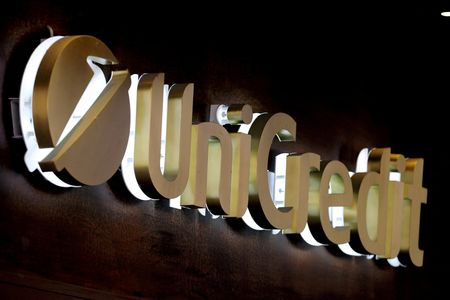By Valentina Za
MILAN (Reuters) – The European Central Bank has slightly increased the amount of capital UniCredit must hold as it takes a fresh look at banks’ assets given risks from the economic downturn and war in Ukraine.
The ECB raised UniCredit’s minimum threshold for best quality capital to 9.20% of risk-weighted assets for next year from 9.03% at present, Italy’s only bank regulators deem of global systemic relevance said on Thursday.
That reflects an increase of a quarter of a percentage point in so-called Pillar 2 guidance, a bank-specific recommendation set by the ECB in addition to lenders’ binding capital requirements to make sure they can weather stress.
The ECB has raised the capital thresholds also of smaller peer Banco BPM and, fractionally, market leader Intesa Sanpaolo.
The setting of new capital thresholds under the SREP supervisory process to shore up banks’ defences, has fuelled tensions between lenders and the ECB, a person with knowledge of the matter told Reuters.
UniCredit’s slightly higher requirement reflects in part the regulator’s worries about the economy and also the difficulty for banks to accurately assess risks given the sudden spike in inflation and pandemic-related government support measures.
In UniCredit’s case it also reflects ECB concerns about the bank’s failure to extricate itself from Russia, a second source with knowledge of the matter added.
“There is no impact on UniCredit’s 2022 and future distribution ambitions, funding plan and capital targets, which remain as per guidance,” the bank said in a statement.
At the end of September, UniCredit’s core capital stood at 15.4% of its risk-weighted assets, on a fully-loaded basis.
Taking into account the new Pillar 2 requirement, UniCredit’s buffer for capital distribution is 621 basis points.
UniCredit rebuilt its capital reserves under previous Chief Executive Jean Pierre Mustier through massive asset disposals and a 13 billion euro new share issue.
In an effort to boost UniCredit’s share price, new CEO Andrea Orcel has pledged to return more than 16 billion euros in dividends and buybacks to shareholders by 2024, while also replenishing the buffers through profits generated via capital-light businesses.
UniCredit paid out 3.75 billion euros to shareholders over 2021 earnings in dividends and two share buybacks worth in total 2.58 billion euros approved by the ECB after discussions which sources have said have been tense.
UniCredit had initially put on hold the buybacks when the Ukraine war first broke out.
Orcel has slammed as “morally wrong” the move of rivals such as Societe Generale to sell their Russian unit at a loss to a local buyer.
(Reporting by Valentina Za; editing by Jason Neely and Elaine Hardcastle)

